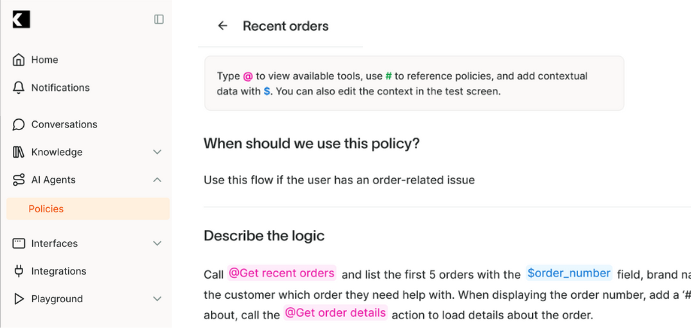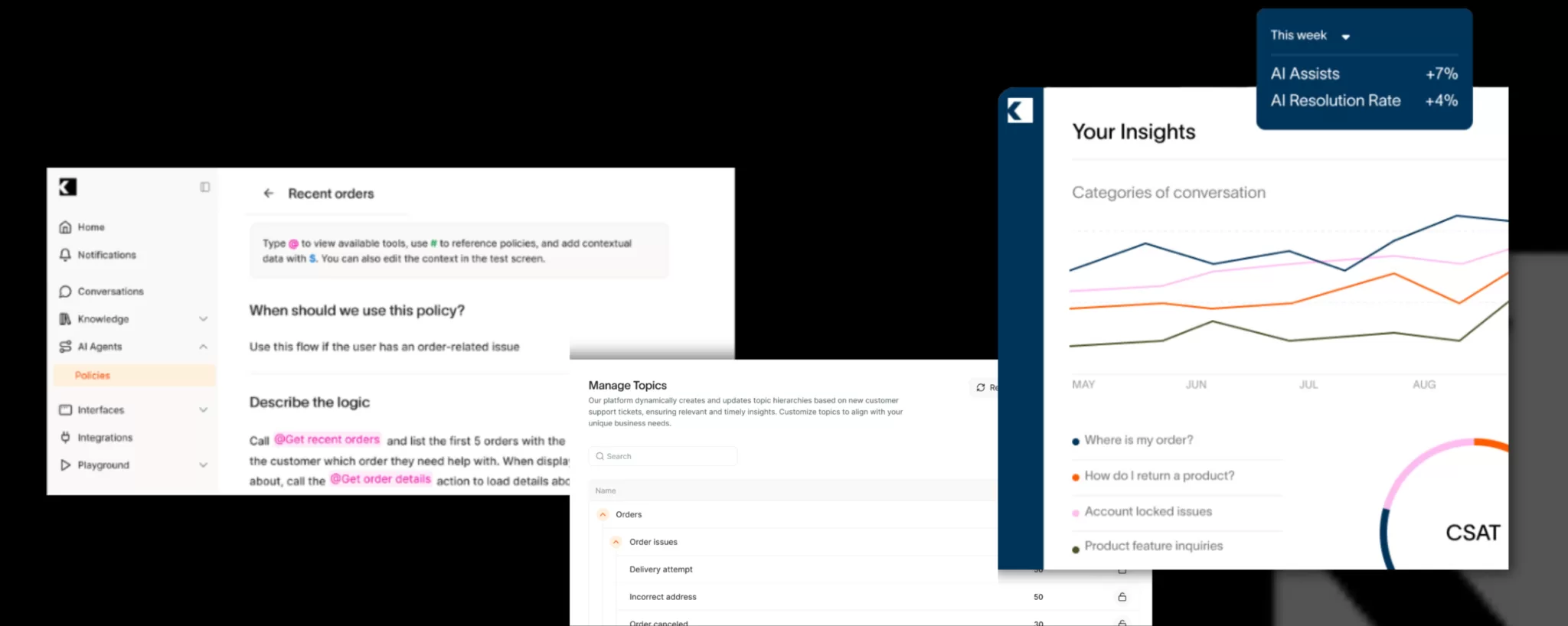Ingredients
Leverage Magento, Gorgias, and Kodif to streamline your customer support operations with ease.
What are AI Policies?

At Kodif, we’re excited to announce the launch of Policies—a powerful, dynamic solution designed to revolutionize the way CX managers handle customer support. Unlike traditional flows, which are rigid and complex, Policies empower non-technical users to create and manage customer interactions with ease. Written in natural language, Policies make it simple to define and refine customer experiences without needing to rely on complicated flowcharts or scripting. This approach is not only user-friendly but also self-serve, enabling CX teams to quickly translate existing Standard Operating Procedures (SOPs) into automation, saving valuable time and resources.
The flexibility of Kodif Policies ensures that businesses can offer personalized, context-driven support while continuously improving customer experiences. With Policies, you can experiment with different strategies to optimize outcomes such as CSAT, revenue, and retention—all without the need to rebuild complex workflows. Whether it’s automating routine interactions or testing new approaches for high-stakes scenarios, Policies provide a scalable, adaptable solution that aligns with your business goals. While flows still have their place in sensitive, high-risk situations, Policies offer an agile alternative that helps businesses innovate faster and deliver exceptional, tailored experiences at scale.
What is Warranty Claim Policy?
A Warranty Claim Policy in customer support refers to the systematic process of handling requests from customers seeking to claim warranty coverage for products that are defective or not functioning as expected. It involves verifying the validity of the claim, ensuring the product is still within the warranty period, and facilitating the resolution process, which may include repair, replacement, or refund. Efficient management of warranty claims is crucial for maintaining customer satisfaction and trust.
Which Platforms does this AI policy work on?
This AI policy is designed to work seamlessly on Magento and Gorgias, among others. Thanks to Kodif, it integrates with all other major platforms, ensuring broad compatibility and ease of deployment across diverse systems.
When should I use this policy?
Use this policy when a customer requests to file a warranty claim for a product.
Describe the Logic:
- Ask for the user’s email address:
- Use
@get_shopify_account_detailstool to verify if the email exists in Shopify. - If the email is not found, prompt for a valid email address.
If still not found, route the query to an agent.
Display Recent Orders:
- Use
@get_shopify_ordersto fetch recent orders. - Present the orders to the user and ask which order they are inquiring about.
If no orders are found, escalate to an agent.
Check Order Status:
Use
@shopify_order_detailsto verify the order’s status.Validate Warranty Eligibility:
- Assess order date and warranty terms.
- Use
@check_warranty_eligibilityto confirm warranty status. If ineligible, inform the customer using a macro.
Create a Support Ticket for the Warranty Claim:
- Request a description of the issue from the customer.
- Collect order details and instruct the customer to send supporting documentation.
- Use a macro to confirm ticket creation and request additional information from the customer.
Policy Logic
This policy is activated when a customer seeks to file a warranty claim.
Describe the Logic:
- Ask for the user’s email address:
- Use
@get_shopify_account_detailstool to verify if the email exists in Shopify. - If the email is not found, prompt for a valid email address.
If still not found, route the query to an agent.
Display Recent Orders:
- Use
@get_shopify_ordersto fetch recent orders. - Present the orders to the user and ask which order they are inquiring about.
If no orders are found, escalate to an agent.
Check Order Status:
Use
@shopify_order_detailsto verify the order’s status.Validate Warranty Eligibility:
- Assess order date and warranty terms.
- Use
@check_warranty_eligibilityto confirm warranty status. If ineligible, inform the customer using a macro.
Create a Support Ticket for the Warranty Claim:
- Request a description of the issue from the customer.
- Collect order details and instruct the customer to send supporting documentation.
- Use a macro to confirm ticket creation and request additional information from the customer.
Example Policy
This policy is employed when a customer requests to file a warranty claim for a product.
Describe the Logic:
- Ask for the user’s email address:
- Use
@get_shopify_account_detailstool to verify if the email exists in Shopify. - If the email is not found, prompt for a valid email address.
If still not found, route the query to an agent.
Display Recent Orders:
- Use
@get_shopify_ordersto fetch recent orders. - Present the orders to the user and ask which order they are inquiring about.
If no orders are found, escalate to an agent.
Check Order Status:
Use
@shopify_order_detailsto verify the order’s status.Validate Warranty Eligibility:
- Assess order date and warranty terms.
- Use
@check_warranty_eligibilityto confirm warranty status. If ineligible, inform the customer using a macro.
Create a Support Ticket for the Warranty Claim:
- Request a description of the issue from the customer.
- Collect order details and instruct the customer to send supporting documentation.
- Use a macro to confirm ticket creation and request additional information from the customer.


